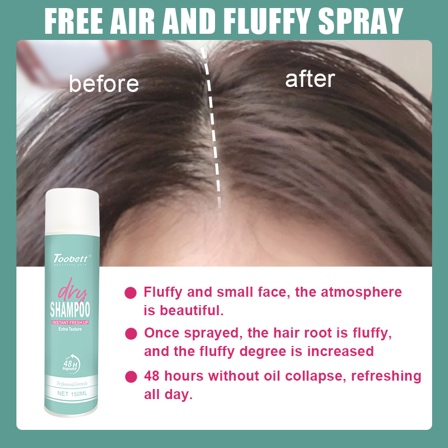Dry Shampoo Made in China: Product Functional Advantages
Dry shampoo made in China has rapidly gained traction due to its practicality, affordability, and ability to cater to diverse consumer needs. With the country’s robust manufacturing infrastructure and strong focus on innovation, Chinese-made dry shampoos are increasingly popular not just domestically, but also internationally. Here’s a deeper look at the key functional advantages of these products:
1. Convenience and Time-Saving
The primary functional advantage of dry shampoo is its ability to refresh hair without the need for water, which is particularly beneficial for individuals leading fast-paced lifestyles. In urban areas like Beijing, Shanghai, and Guangzhou, long working hours, hectic commutes, and busy schedules leave many people with limited time for traditional hair washing routines. Dry shampoo offers a quick and effective alternative, allowing consumers to maintain fresh-looking hair without the need for a full wash. This saves significant time and effort, making it an essential product for busy professionals, students, travelers, and those with active lifestyles. In a country like China, where people often prioritize convenience, dry shampoo is an ideal solution for maintaining a polished appearance on the go.
2. Tailored Formulations for Different Hair Types
Chinese manufacturers have increasingly adapted dry shampoo formulas to meet the diverse needs of local and global consumers. Many of these products are specifically designed to address common hair concerns such as oily scalps, flat hair, or dry, damaged hair. For example, formulations targeting oil absorption are particularly popular among individuals with oily hair or those who struggle with greasy roots, a common issue in hot, humid climates. These dry shampoos can absorb excess oil and help the hair appear fresh without the need for washing.
For individuals with fine or flat hair, Chinese-made dry shampoos often incorporate volumizing agents to add body and texture, helping to lift limp strands. Similarly, those with dry or damaged hair benefit from formulas that include nourishing ingredients like aloe vera, rice powder, or green tea extract, which not only refresh the hair but also provide hydration and care. This wide range of tailored formulations ensures that Chinese dry shampoos can meet the needs of various hair types and textures, making them a versatile option for many consumers.
3. Lightweight and Residue-Free Formulas
One common complaint with traditional dry shampoos, particularly in the early years of the product’s popularity, was the heavy white residue they often left on dark hair. However, Chinese-made dry shampoos have made significant strides in creating lightweight, residue-free formulations. Many products are designed to blend seamlessly into the hair, leaving no visible trace, even on dark or black hair. These formulas are often finely milled, offering a finer spray that is less likely to clump or leave a powdery finish. This is a particularly important consideration for Chinese consumers, who often favor natural, glossy hair without visible product buildup. The focus on invisible formulas has made dry shampoo much more appealing and effective for a broader range of users.
4. Use of Natural and Eco-Friendly Ingredients
As the clean beauty trend continues to gain momentum worldwide, Chinese manufacturers are increasingly integrating natural and eco-friendly ingredients into their dry shampoo formulas. Many products now feature plant-based ingredients such as rice starch, aloe vera, tea tree oil, and green tea extract, which not only serve to absorb oil but also nourish and hydrate the scalp. These natural ingredients appeal to environmentally conscious consumers who prioritize clean and sustainable beauty products.
Additionally, eco-conscious formulations often extend to packaging. Many Chinese dry shampoo brands are adopting recyclable or biodegradable packaging to minimize their environmental footprint, a trend that aligns with the growing global focus on sustainability. Cruelty-free formulas, free from parabens and sulfates, are also becoming more common, ensuring that Chinese-made dry shampoos meet the ethical and environmental standards of modern consumers.
5. Cultural Relevance and Adaptation
Chinese-made dry shampoos often cater to local cultural preferences. For example, many products are designed with lighter scents or fragrance-free options, aligning with the Chinese preference for subtle, delicate fragrances. Additionally, the growing awareness of traditional Chinese medicine (TCM) has influenced the inclusion of herbal ingredients like ginseng, chrysanthemum, or licorice, which are believed to promote healthy hair and scalp. These culturally relevant features make Chinese dry shampoos more appealing to domestic consumers, who value both modern solutions and traditional remedies.
Conclusion
Dry shampoos made in China offer a host of functional advantages, including affordability, convenience, tailored formulations for various hair types, and the use of natural ingredients. These products provide practical, effective solutions for modern consumers, particularly those with busy lifestyles or specific hair care needs. The growing focus on sustainability, e-commerce, and cultural relevance ensures that Chinese-made dry shampoos continue to be competitive in both domestic and global markets. With continued innovation and consumer-focused approaches, they are well-positioned for sustained growth and success.
Post time: Nov-11-2024









